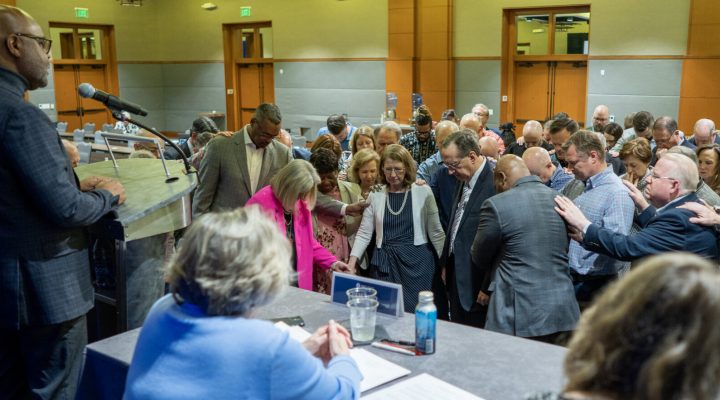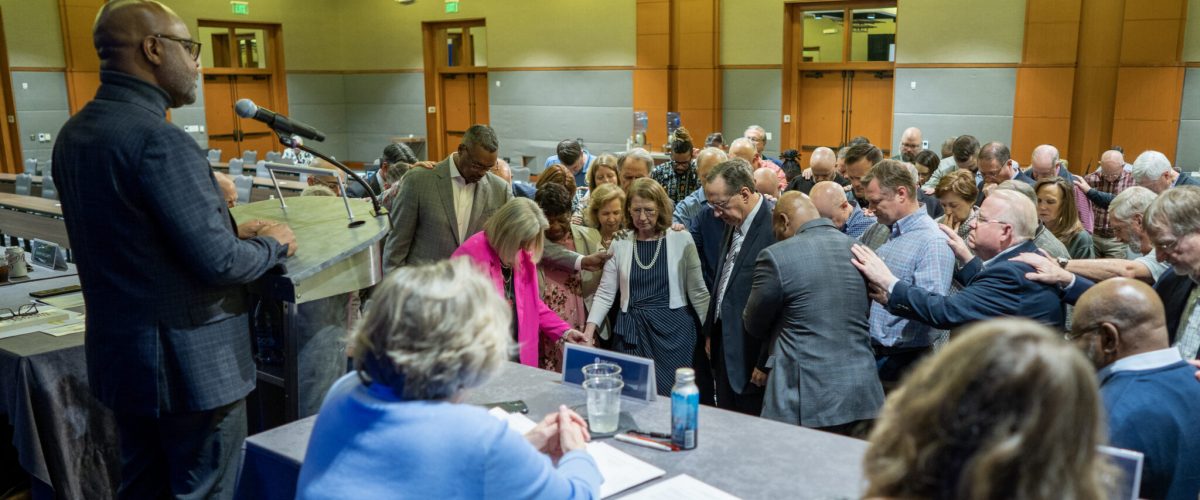By a unanimous vote of the 60 trustees attending today’s called meeting of the Southern Baptist Convention Executive Committee, longtime Gateway Seminary president and one-time Home Mission Board-appointed church planter Jeff Preston Iorg was elected chief executive officer of the Nashville-based administrative arm of the SBC.
Today’s meeting marked the third time in five years trustees have gathered at the DFW Airport Grand Hyatt to elect a new leader and the second time within less than a year. There are 83 current Executive Committee trustees.
Iorg’s election is the second time in SBC history a seminary president has been chosen to lead the Executive Committee (the first was Duke McCall) and the first since 1979 that the Committee went outside a pool of former convention presidents (the last three full-time leaders held the convention’s top elected office before accepting appointment in Nashville).
In many ways, Iorg’s election is a return to business as usual. In other ways, Iorg may prove exactly what a dysfunctional and beleaguered Executive Committee needs as the convention prepares for a potentially raucous and self-defining gathering of messengers at the annual meeting in Indianapolis later this year.
Meeting in closed session for less than an hour, Executive Committee trustees questioned Iorg about his positions on issues ranging from the convention’s past handling of sex abuse to proposed changes to the convention’s governing documents scheduled for votes this summer. Outside the conference room where guests and journalists waited for the vote announcement, numerous cheers and ovations could be heard.
“Iorg, for the moment, has managed to unite one of the most hotly divided groups in the SBC.”
Iorg, for the moment, has managed to unite one of the most hotly divided groups in the SBC. Whether that unity lasts until May when he officially takes the reins full time is anybody’s guess. But the hopeful spirit among Executive Committee members was palpable, owing in part to the confidence Southern Baptists have cultivated in Iorg over the past two decades of his leadership and to relief at the end of an exhausting, embarrassing and elusive two-and-a-half-year search process.
The transition from leading a seminary that all Southern Baptists have wanted to succeed to leading an Executive Committee that some Southern Baptists have wanted to fail will prove a challenge for Iorg. In Mill Valley and eventually Ontario, Calif., where Golden Gate Seminary relocated in 2016, Iorg was largely off the radar for Southern Baptist powerbrokers. Stepping into the presidency of the Executive Committee will be another story. Iorg has been at the table of leadership for a long time. Now, he occupies a different and more influential chair.
Southern Seminary President R. Albert Mohler Jr., for one, has openly stated his desire to see the Executive Committee’s role downsized and its ministry assignment constricted to basic administrative functions. If Iorg is smart — and I have every reason to believe he is — he will right-size the Executive Committee’s bloated membership while reaffirming its essential role as the convention’s fiduciary and financial watchdog.

Jeff Iorg
Success for Iorg, in other words, might get him bumped from some convention-funded Christmas card lists but would provide a reset of equilibrium on the Great Commission Council, which has for too long been inordinately dominated by a few members of the Council of Seminary Presidents.
Chief among the internal challenges facing Iorg are the workplace culture self-identified by female Executive Committee employees as “dismissive” and “disrespectful” of women and tolerant of “demeaning, objectifying comments.”
At a press conference following his election, Iorg pointed to his record of affirming and training female ministry leaders at Gateway Seminary as evidence of the kind of workplace culture he would nurture. When asked about the 17 recommendations arising from the 2022 Guidepost Solutions report for improving the Executive Committee’s handling of sex abuse and strengthening corporate culture, Iorg was non-committal although he acknowledged a need to reassess the Guidepost recommendations as he prepares to take over in Nashville.
To be sure, some of the Guidepost recommendations are both impractical and ill-advised. Installing a sculpture or a garden of reflection for the survivors of sex abuse, for instance, would meet considerable and appropriate resistance. After decades of inaction, and in some cases outright cover-up, even the most ardent reform advocates would scoff at such a move as more empty denominational posturing.
But other recommendations — like the establishment of a chief ethics and compliance officer, the elimination of confidentiality agreements in sex abuse cases, and the enactment of a robust document retention policy at the Executive Committee — deserve Iorg’s full attention and swift action.
Moreover, Iorg now must guide the Executive Committee as it wrestles with growing calls for greater financial transparency from Cooperative Program-funded entities. That effort, now under consideration ahead of the Indianapolis convention, has faced obstacles and roadblocks from Iorg’s counterparts on the Great Commission Council who protest that the detailed financial disclosures messengers have called for are too onerous to produce.
“Today’s SBC leaders seem perfectly happy for the churches to know what is said in seminary classrooms or missionary training centers, but not necessarily to know how much is spent in seminary presidential homes and office suites.”
Not lost on many who are calling for increased transparency is the irony of the moment. Under earlier moderate administrations, convention leaders were often frustrated by conservative efforts to expose what was happening in seminary classrooms. Yet despite a perceived hostility to greater classroom transparency, the pre-conservative resurgence convention was marked by greater financial transparency, open disclosure of executive compensation, and more access to financial records by the churches who pay the bills.
Today’s SBC leaders seem perfectly happy for the churches to know what is said in seminary classrooms or missionary training centers, but not necessarily to know how much is spent in seminary presidential homes and office suites or how much is spent on legal fees, convention swag or outside consultants. If Iorg facilitates a new season of more transparent stewardship and a return to pre-resurgence levels of financial disclosure, he will have done much to restore confidence in the Executive Committee’s fiduciary competence. In doing so, he will make friends where he needs them. And he will need them.
Because while making those friends he is likely to draw out detractors who prefer an Executive Committee that is both benign in its enforcement of the convention’s authorized financial controls and overly accommodating of SBC entity executives who chafe at any hint of outside accountability.
And as with every vote in Southern Baptist life, Iorg had his first and likely only unanimous vote at the Executive Committee today. The next votes — the ones that will really count — will doubtlessly test Iorg’s patience. And probably his spine.

Benjamin Cole
Benjamin S. Cole is a crisis communications consultant who lives in Plano, Texas, and tweets about SBC life under the pen name The Baptist Blogger.


